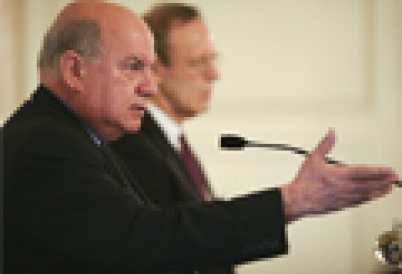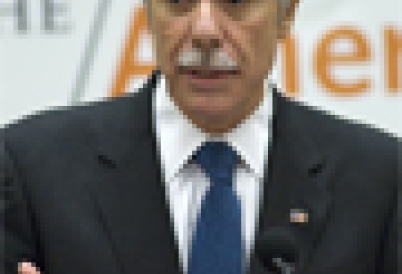In an AS/COA Online interview, OAS Secretary General José Miguel Insulza describes the role of the agency in negotiating recent border tensions between Ecuador and Colombia, autonomy and recall votes in Bolivia, and U.S.-Cuba relations. "[T]he OAS has to prove itself as the main forum for political dialogue in the Americas," said Insulza.
U.S. Secretary of Commerce Carlos Gutierrez called for passage of the U.S.-Colombia Trade Promotion Agreement and improvements in Cuba’s human rights at COA's annual Washington Conference on the Americas. He announced a May 21, 2008 White House event to “shine a spotlight” on political prisoners in Cuba.
In a speech at the 2008 Washington Conference, Secretary Gutierrez decried the changes taking place under Cuba’s Fidel Castro as “superficial.” He called for passage of the U.S.-Colombia Trade Promotion Agreement. Read his remarks.
At the Miami launch of the latest issue of Americas Quarterly, a panel moderated by Miami Herald columnist Andrés Oppenheimer examined Latin American social mobility and hemispheric trade policy, as well as Cuba’s economic outlook following Raúl Castro’s accession.
Cuban workers and students have started to speak out against the failures of the revolution and the lack of changes. Recent pools indicate that the majority of Cubans are unhappy with the level of personal and economic freedom. Read the entire article in the Spring 2008 issue of Americas Quarterly.
Cuba's new President is anything but, and the much expected change in power will bring only minor modifications for Cuba's long-suffering citizens, write Gary Max and Cecilia Vaisman. Read a preview of this article appearing in a special report on Cuba in the Spring 2008 issue of Americas Quarterly.
In testimony to the U.S. House of Representative Committee on Foreign Affairs, AS/COA Senior Policy Director Christopher Sabatini discusses the meaning of Fidel Castro’s stepping aside and its implications for Cuba and the Hemisphere.










